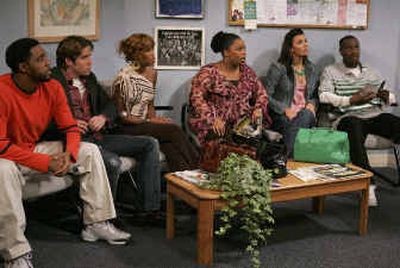HIV awareness

“Being ‘P.C.’ can be death to comedy,” says Meg DeLoach.
And that’s exactly what the creator and executive producer of UPN’s “Eve” wanted to avoid in the sitcom’s episode tonight.
In “Testing, Testing, HIV,” Shelly (played by rapper-actress Eve) is eager to go to “the next level” with her new beau. But he insists she get an HIV test.
Afraid to go it alone, she rounds up her guy and gal pals for the trip to the clinic where real-life realities about the disease are played in tandem with raucous gags.
“We even have (a character) at the clinic taking pictures, recording this occasion, and saying things like, ‘Smile! Say HIV,’ ” DeLoach giggles.
“It is a serious subject, but it’s OK to laugh in these situations,” she continues. “I’ve taken several HIV tests, and even when there’s no reason to be worried, I worry.
“Oftentimes you’re just terrified. The flip side to the terror is that nervous laughter of what the results are going to be. But you can’t laugh until you know what’s going on.”
“Eve” is among many Viacom-owned network shows to address the issue through its 3-year-old “Know HIV/AIDS” initiative. It’s a project in partnership with the nonprofit Henry J. Kaiser Family Foundation.
“It might seem like odd bedfellows – Kaiser and Viacom,” says Kaiser Vice President Tina Hoff from her office in Menlo Park, Calif.
“But we’re a company that tries to reach out to people with information. Viacom can reach them. That’s why the relationship works so well.”
Viacom has committed $600 million to the effort, with about $220 million to be spent this year on its multimedia “Knowing Is Beautiful” campaign featuring six public service announcements for its television, radio and outdoor billboard properties.
(The Viacom comglomerate includes CBS and UPN; cable networks MTV, BET, VH1, CMT: Country Music Television, TV Land, Nick at Nite, Showtime, Spike TV and Comedy Central; and 183 Infinity Broadcasting radio stations in the top 50 markets.)
So far, campaign messages have been translated into seven languages reaching millions throughout Africa, the Caribbean, Britain, Russia and China.
In scripted programming, CBS’ top drama, “CSI: New York,” and long-running “Judging Amy” have featured HIV/AIDS-themed shows this season.
In June, Showtime’s “Queer As Folk” will tackle a three-episode arc in which Hunter, a heterosexual teen played by Harris Allan, is ostracized at school for being HIV-positive.
“These were issues we would have dealt with anyway because of the world of the show,” says co-executive producer Daniel Lipman.
“But it’s important, personally, because the first wave of AIDS hit people that I knew. Since ‘Queer As Folk’ has been on, (AIDS) has come back furiously. and a whole new generation has to deal with this.”
“The feedback and the reception we’ve gotten, particularly from those who write and produce our programs, has been amazing,” says Carl Folta, executive vice president of corporate relations for Viacom, which has won an Emmy and a Peabody award for the initiative.
“So many recognized immediately that they were in a very powerful position to do something about this.”
Considering the pervasiveness of American media, HIV advocacy and education groups agree.
“Anytime a media giant like Viacom takes on the challenge of educating people about HIV, it is a very good thing for anyone concerned about HIV,” says Sarah Whitehead, director of communications for AIDS Action in Washington. But in recent years, AIDS has lost much of its media appeal due to the development of more effective drugs.
“There is no cure,” says Whitehead, “and the side effects of current medications are debilitating. There are social and psychological consequences that people living with HIV face (that) are still as real today as they were in the beginning stages of the epidemic.”
Nearly 40 million people – more than ever before – are living with the disease worldwide, according to a December 2004 report published by UNAIDS, a joint U.N. program.
Racial and ethnic minorities have been disproportionately affected, according to Kaiser, representing 71 percent of new AIDS cases – primarily among blacks, Latinos and American Indians.
As troubling as those statistics are, Kelli Lawson, executive vice president of corporate marketing for BET, says Viacom’s outreach efforts are effecting change.
In a survey of blacks conducted by Kaiser last August, among 18- to 24-year-olds exposed to Viacom’s campaign, half said they had discussed safe sex practices with their partner because of the Viacom campaign.
And nearly 77 percent of that group who were sexually active said they were more likely to use a condom because of the campaign.
“It really is a tremendous initiative, and the results have been phenomenal,” says Lawson “It’s been just such a huge, huge effort. It has made a difference.”